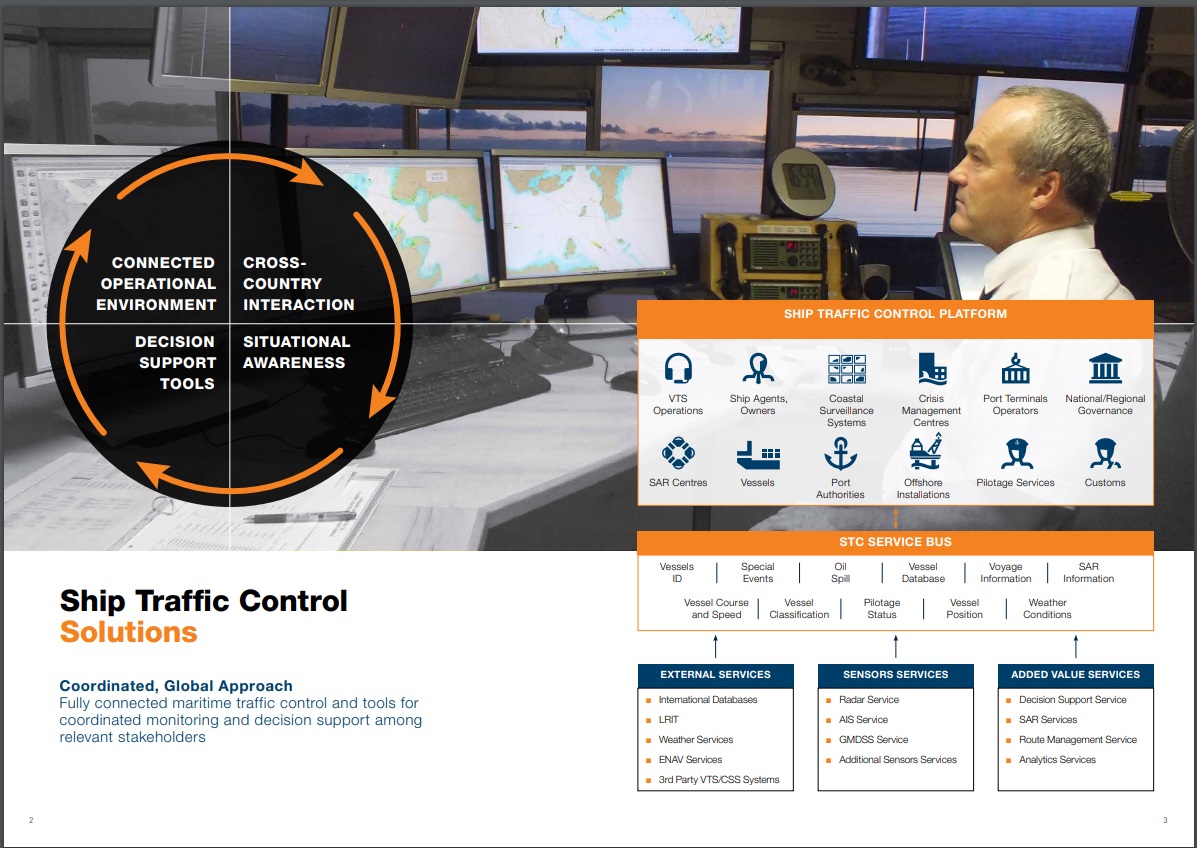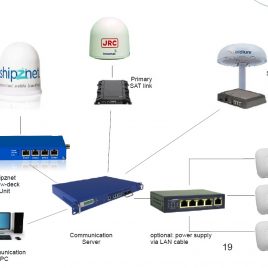Description
Ship Traffic Control Solutions
Coordinated, Global Approach
Fully connected maritime traffic control and tools for coordinated monitoring and decision support among relevant stakeholders
LEADING THE PROGRESS IN GLOBAL SHIP TRAFFIC CONTROL
Ship Traffic Control Solutions, with the support of automated self-learning decision support technologies, make it possible to operate a ship traffic control model similar to that available to the aviation industry. Ship movements can be advised and controlled by a country, even beyond territorial waters. A new generation of Ship Traffic Control and Management Solution is required to extend safety and efficiency of navigation far beyond the limits of traditional coastal systems.
ESTABLISHING PORT‑TO‑COAST‑TO‑COUNTRY‑TO‑COUNTRY MONITORING, CONTROL AND SUPPORT SYSTEMS
All technologies can be connected through one central operating system enabling the data to be available across the whole operational ecosystem. Collect and process various streams of data Integrate it into a common operational picture Share between all relevant stakeholders
Vessel Traffic Services COORDINATION OF VESSEL TRAFFIC AND PORT CALLS
Scheduling approaching vessels optimizes port load and INCREASES EFFICIENCY
Distribution of common data to several operations stations improves VTS TEAMWORK
Operator receives FULL INFORMATION about VTS area as the result of automatic processing and fusion of data from various sensors, such as radars, AIS, CCTV, RDF, GMDSS, weather stations
Advanced decision support system helps operators to recognize a dangerous situation long before it escalates, and thus increases SAFETY
Electronic chart overlay, combined with vessel positions and sensor data, provides a FULL TRAFFIC IMAGE
3D VTS significantly enhances SITUATION AWARENESS
Traffic management tools provide a basis for TRAFFIC COORDINATION
Open interfaces enable INFORMATION EXCHANGE between VTS and other services
COMMUNICATION EQUIPMENT allows interaction with vessels
Recording system stores ALL DATA for debriefing and accident analysis
Coastal Surveillance Systems
CREATION OF A COMMON OPERATIONAL PICTURE
Integration of local and regional operations centres into a national scale system improves the CHAIN OF COMMAND
Mobile sensor sites IMPROVE SURVEILLANCE
Blending data from many sensors types allows for DETECTION OF EVEN SMALL TARGETS
ANOMALY DETECTION module picks out targets exhibiting suspicious behavior amongst all vessel traffic
Integrated CCTV/EOS helps to VISUALLY IDENTIFY UNKNOWN TARGETS
Enhanced monitoring and control of own assets FACILITATES INTERCEPTION
Advanced radar processing system TRACKS HIGH-SPEED MANEUVERING TARGETS
Data is stored for HISTORIC TRENDS ANALYSIS AND STATISTICS
Multipurpose target classification (friend or foe) improves AWARENESS
Long-range sensors can EXTEND COVERAGE up to the edge of an Exclusive Economic Zone (EEZ)
Full all-component redundancy provides CONTINUOUS OPERATIONS
Offshore Solutions
EFFECTIVE MONITORING AND TRACKING OF ACTIVITY AT OFFSHORE INSTALLATIONS
Advanced strike prediction module provides EARLY WARNING for all approaching unauthorized vessels of any type
Anchoring detection system helps to PROTECT UNDERWATER INSTALLATIONS, such as cables or pipelines, from damage
Special tools help operators to improve COORDINATION OF MARITIME OPERATIONS
Long range detection of even small targets provides SECURITY OF THE INSTALLATION AREA
CLEAR AUDIO AND VISUAL PRESENTATION of alarms allows asset coordination to be combined with other tasks
Integration of OIL SPILL DETECTION system protects the environment
Virtual AtoN broadcast improves SAFETY OF INSTALLATIONS
Integration of multiple sensors allows SEVERAL INSTALLATIONS TO BE PROTECTED FROM ONE CONTROL CENTRE
Integration with ADS-B displays HELICOPTER TRAFFIC
Moving of infrastructure to onshore premises REDUCES INSTALLATION COSTS





